Interview of Tenzin Palmo with Dr Lwiis Saliba
There are two recordings of this interview online, that by Lwiis, with some direct talks with Tenzin Palmo, then by Jacques after the question 4 on women in the Tibetan Tradition until the end of Tenzin Palmo talk and of Lwiis and Jacques’ dialog. You can see them by following this link :
https://drive.google.com/drive/folders/1VV9u6wkT-b7v7WTyEMdcX-ocTtk0fZxF?usp=sharing
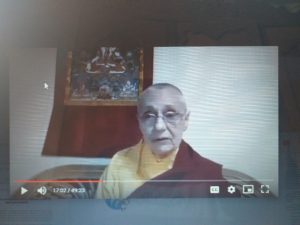
Jetsunma Tenzin Palmo During the Interview wit Dr Lwiis saliba
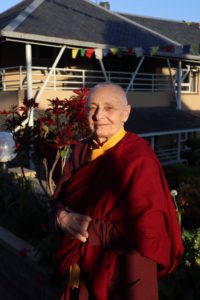
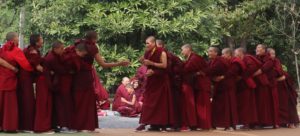
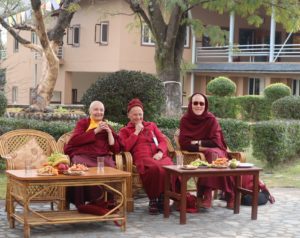

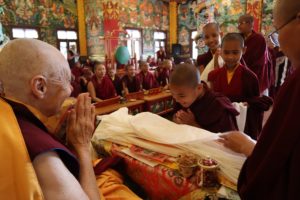
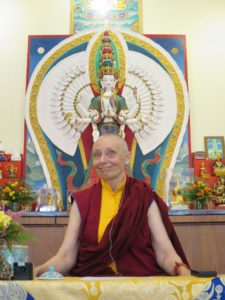

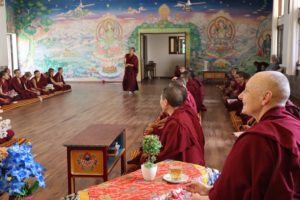
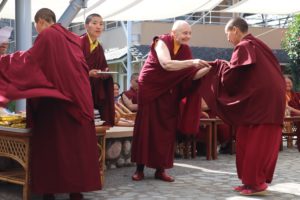
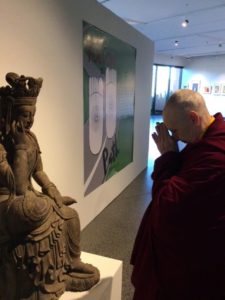
Conversation of Jetsunma with Lwiis saliba before the start of the session.
We evoked an interreligious conference in Lebanon in 2006. Jetsunma had received an invitation for it : “ They wanted to hear another voice. I was going to go, but suddenly there was a war between Israel and Lebanon, so everything was cancelled! Later , I went to Israel in a kibbutz, near the northern border. They told me that just two weeks before,, there were planes going in the sky and dropping bombs. What a world!”
Lwiis Saliba : we showed your interview on meditation at the beginning of our conference on Meditation and Science in a Beirut University in May 2019, and participants were much interested. They asked me to invite you because here, they need such a knowledge and speech.
Tenzin Palmo : I think they need a voice from outside, not caught in history where they are entangled, while everyone is tense on its own positions.
Jacques Vigne : So, do they need a good dose of enlightened common sense ?
TP : Yes, common sense can help a lot.
LS: I visited many time Rishikesh and few times Dharamshala, so we hope to visit you once with a group.
TP (immediately, joining hands with a smile) : Please come ! Of course, once this lockdown thing will be finished.
Asked by Lwiis about her phone number, TP goes up to fetch it, saying with a smile : “I don’t know it…I never phone myself”…She adds :”In fact, I use this phone only as an alarm clock in the morning.”
LS : We would be pleased, should you come in Lebanon!
TP : Well, we’ll see when the time comes. Now there is this lockdown. Who knows when it will cease? They say it decreases in one spot, but afterwards the virus goes mutating, so vaccines don’t work anymore…
LS : Which kind of precautions do you take in your monastery?
TP : the main one is that nobody goes out, and no visitors are allowed, since the first lockdown. Everyone is doing his occupation, so far nobody is infected. Government is pushing for vaccination everywhere, still now they are administrating doses only to those over 60. The community here is quite young, between 5 and 45, mostly around 20, so they will be the last to be vaccinated, if they want. I let them decide themselves. Anyhow, there will be many months before that, there is not enough vaccines, because also India is distributing to neighboring countries, to Nepal, Bhutan, etc.
LS : Will you move?
TP : I have been here since December 2019. We didn’t go out of the compound here from March last year. In fact, it’s very nice to stay in this place, to enjoy the regular rhythm of the monastery. Usually, I’m running all over the planet. And also, nuns are happy that I am here. They don’t go out. We have ground, so they aren’t stuck in the buildings.
Interview with Tenzin Palmo
Wednesday 14 April 2021, 17h30-18h30 Paris time
Lwiis Saliba : We are very happy that Jetsunma is here with us this night, to answer the questions we prepared with Dr Jacques Vigne. There is not much to do to present her, since she is well known. I will summarize it in a few words : my first meeting with her was through her first book to be published in French, “Un ermitage dans la neige” (A Cave in the Snow). Since that time, Jacques Vigne spoke to me about her and made the link. On May, 25 2019, we had the conference in Beirut on Science and Meditation and introduced it with a video of her on meditation. People were so impressed! I transformed this speech in an interview and published it in a famous magazine in Lebanon. It has a very good effect, and people asked me to be more in contact with her through other interviews, and maybe a visit in the country. Even though she hasn’t come here physically, at least, we are now in a direct dialogue with her through this zoom.
Our deep greetings with joined hands. Now, we’ll start the first question.
LS : Dear Jetsunma(literally “Mother Yogini,” a title she received from the Gyalwang Drugpa in 1986 in Kathmandu and which is rare among women, even Tibetan ones), do you first have a message for us?
TP : No, not really. I just want to say that I am very honored to be allowed to speak to you in Lebanon, directly from where I am, in North India. Modern technology has brought many ills to the world, but also some gifts : for instance, this possibility to unite and gather from every part of the world and communicate as well as teach each other. This is a time where it is very important, as human beings, we do interconnect and hear each other. So, I am very honored to be invited by you.
Questions of Lwiis Saliba to Tenzin Palmo
LS : 1- Jetsunma, as a British woman by origin, why and how were you attracted by Buddhism and specially by Tibetan Buddhism?
TP : It’s a long story, but in very short, since early childhood, I had the idea that our nature is inherently perfect, that our true nature is beyond thoughts, but we have lost contact with it, so we need to come back again and again until we rediscover who we are in reality. So, since that time, I was looking for a path towards this inner perfection. However, all the religions I came across, Christianity, Judaism – I even tried to read the Koran – didn’t speak to me because I had not much feeling for some outer being who was like, you know, a puppet master pulling the strings and at the end setting to judge us. I didn’t believe that, but most of the religious discourses I knew of were speaking of this. Then, when I was a teen, I read a very simple, basic book on Buddhism. It spoke of the four noble truths, the eightfold path and so on…It was whatever I had known inside, but even then, I was so grateful to the Buddha to explain so clearly about our innate nature and how to reach it, not only what to do, but how to do it. I mean, Buddhism is full of techniques for transforming our mind. So, even before finishing the book, I knew that I had not only become Buddhist, but that I had ever been so. However, I didn’t know it. As for Tibetan Buddhism, I wasn’t yet attracted, because it was 1961, very little was known about it, the Dalai Lama had just escaped from Tibet in 1959, nobody knew well what was going on, Tibetan were refugees, Chinese communists had taken over Tibet. So, they were very few reliable information about Tibetan Buddhism. I’d read that there were different traditions within this Buddhism, so a voice within me told me : “O no! Tibetan Buddhism is too complicated!” Anyhow, I realized that if I wanted to study it, I’d need a teacher, so I left for India to find my Lama.
LS : 2- Jetsunma, what does remain in the present-day Tenzin Palmo from the Western civilization and culture?
TP : As you know, basically I’m English and I never tried to become Tibetan. Yes, I certainly want to be a good Buddhist practitioner, but as a Westerner practicing the Dharma, not a Tibetan. So, when I was in my forties, I had been in India for 24 years, I had to leave the country. A friend of mine invited me to Italy, and I felt that, after leaving the West at the age of 21, I needed to reconnect to the Western culture. Italy was definitely a good place for this. It was very enriching. For 24 years, I just heard of Buddhism and Tibetan culture. Over there in the Himalayas, nobody knew about Western art, music and culture, etc. I studied in Italy even about medieval Christianity and Renaissance. Really, it was very nourishing. Tibetan culture is very wonderful, Indian culture is very profound, but Western culture is also very valuable. So, let’s have them all!
LS- 3- Jetsunma, what about the situation of the women in the Tibetan society and specially the situation of nuns in this spiritual tradition?
TP : Although it is understood that we have all the same innate nature, you know that Buddhism, as every traditional religion in the world, is quite patriarchal. It has always been that women had a secondary role. Even if Tibetan women are very strong, they are nonetheless subsidiary to the male. Especially, the nuns were not given the education that the monks were receiving. As a result, you are a second-class citizen if you have no education. You need education. However, nowadays, in secular training, girls are receiving the same teachings than the boys, so it is for the nuns. They study the same philosophical texts which the monks have done, and now they are themselves teachers. This is very important. In our nunnery, only one teacher is male, all the other teachers are nuns. So, they are nuns teaching nuns, they have at present a tremendous senses of self-confidence. There is no more inferiority complex in front of the boys. They do anything. What is great too is that the monks accept and respect that, they love them and teach them in the traditional ways. Things have really changed now, in a very short time. This is due to education. As the prime minister of Bhutan remarked, women are usually more devoted, more focused and even more intelligent than the male, so how is it that we have neglected and overlooked them for so long? Now they are not overlooked anymore, all the emphasis is on the empowerment of women.
LS : 4- Jetsunma, in the Buddhist scriptures, are women equal to men, or is it also differences?
TP : There are scriptures where women themselves discuss their own enlightenment experiences, how they met the Buddha, how he taught them and how they got nirvana, and so forth….but on the whole, the books were written by the boys. And when they are written by the males, of course they have their male perspective. Some of the texts are quite misogynic, but not all. In the Mahayana sutras, family and women are well respected, and males are praising women. So, it’s there, but of course, like many other religions, Buddhism is weighted towards a male birth, they consider that women are less fortunate because they have inferior karma.
LS : 5- Jetsunma, what is your relationship to the Dalai Lama, both personally and as a founder of a nunnery?
TP : He is a great inspiration to all of us. I first met him in 1964, and since then I meet him from time to time. When he sees me, he says : “Oh, here is my old friend!” because we’ve known each other for many years. He is very warm, very loving, he makes big hugs. He is quite supportive for women, of course. He supports nuns’ full ordination, etc. He is not my master, he belongs to another monastic tradition, but for all Tibetans, he is the man who unites them. Even if they don’t agree with all his policies, they know he is a very good man. He encourages education for men and women, and many of his cabinet members are women. It’s really extraordinary, considering all what he had to put up with, to see how kind he is, how warm-hearted with everybody. He is the one in which all the Tibetan people recognize themselves.
LS : 6- Jetsunma, how the actuals problems due to the Covid-19 can awaken consciousness in Arabic countries and throughout the world?
TP : One thing which is coming up now is our interconnection as human beings. It doesn’t matter whether you are male or female, Arab or Lebanese or French or British or American or Japanese, you can’t care less, the virus is interconnecting us all. It shows us very clearly that beyond all these very superficial differences and divisions we are all, at the end of the day, human beings. We are all inhabiting the same planets, so, where are the divisions when we look at that? We should recognize our interdependence and interconnection, and how to help each other, rather than creating more and more problems on earth. Why we don’t come together to cooperate? We aren’t very intelligent, as human beings.
We are fighting each other. We are saying : “I’m right, you’re wrong”. We are fighting on things which are not important instead of collaborating on that which is important. We aren’t developing our genuine intelligence and opening our heart and love and compassion for all human beings. We never learn from our mistakes. We blow up each other, then we breath for a while and we start again. If that is not stupid, tell me what’s stupid? Moreover, we have a beautiful planet, and tell me, what are we doing to it? We are destroying it, we are destroying everything. We aren’t very intelligent, I’m sorry.
LS : 7- Jetsunma, what the monks or any other spiritual seekers should do to protect themselves from the psychospiritual effects of this pandemic ?
TP : First of all, instead of generating more fear and paranoia, we can try to cultivate more compassion and kindness and send that help to the world. Indeed, our thoughts are very powerful, and if we keep on sending thoughts of paranoia, fear, anger, this will pollute the whole psychic atmosphere of the planet. So, everyone who is in a spiritual tradition, and even with no spiritual tradition, it doesn’t matter, should be sending out love, compassion, just out of his good heart, sending his good thoughts into the darkness. Even a single candle will dissipate the darkness, as they say. And it’s true. People could come together in groups and visualize that they send loving kindness, compassion etc to the world around, including to the countries which are considered as enemies, and especially to these countries. This should be done in a spirit of fearlessness. We should not give in to fear, we should practice with fearlessness.
LS : 8- Jetsunma, actually, there is much fear around in the world about this pandemic. How could we help people, especially to overcome this fear?
TP : If you know people who are in need, you can help them. There are groups who help people. There is also the power of prayer, which very important, and of meditation : sending out very strong positive thoughts instead of negative ones; because just feeling miserable won’t help anybody. If we don’t help ourselves, we won’t help anyone else. We are truly interconnected with each other. Our main enemy is just our mind. Everybody wants to be peaceful out there, wants to be happy, don’t want to be sad. We should go beyond these small biased boxes in which we keep our minds and hearts. Let’s come out of the boxes and be expanding, this is very important and we can do it. This is much better than to sit together and become very negative.
LS : 9- Jetsunma, what do you think of Christians, including some monks and nuns, using Buddhist meditations in their practice?
Why not? The attraction of Christians towards Buddhism is that it gives techniques for realizing the essential principles which they are also talking about. For example, in Christianity they talk a lot on love and compassion, and Buddhism has techniques for developing these qualities. It doesn’t just say : “Be kind, be loving”, it gives methods for cultivating them. For instance, loving kindness meditation, the brahma-viharas [with loving kindness, compassion, empathic joy and equanimity]. First, one directs these virtues towards oneself, one wishes oneself to be well and happy, then towards people sympathetic to us, then towards people neutral, then towards our enemies : we still whish to them to be well and happy, and further and further to the whole world. There are many sets of practices that the Christian really appreciate : for instance, how to make the mind more calm, how to open our heart. When I lived in Italy, I went sometimes to those conferences lead by Christian monks, and all these monks from the different Catholic denominations, Benedictines, Capuchins, Jesuits Orders, were all practicing some forms of Buddhist meditation : Vipassana, Tibetan, Zen, and they were coming together to discuss that and to meditate together. They didn’t loose their Christianity for that, on the contrary they enhanced it. Buddhism contribution to the world is practice : it doesn’t mean that you are a Buddhist, you can be anything or nothing, it teaches you how to tame the mind and how to open the heart. This is for everybody, it doesn’t make you a Buddhist for that.
LS : 10- Jetsunma, as a Tibetan nun how do you look to China and communist regime in it who is still occupying Tibet?
I have been to China many times now, mostly on pilgrimage, first in Taiwan and then in the mainland. China has been a Buddhist country for 2000 years and they also experienced great devastation during the Cultural Revolution period. They also suffered as the Tibetans suffered. Now in China, there is a huge resurgence of interest in Buddhism. They are practicing. There is a great interest also in Tibetan Buddhism, many of the Chinese I know have a Tibetan master. There is a good number of practitioners. Many masters in India have a majority of students who are Chinese. Most of the monasteries which were rebuilt in India and in Tibet were so with Chinese money, from Taiwan and now from China itself. China politically creates a lot of problems, but Chinese people themselves are lovely, they are very devoted. Many lamas learn how to speak Chinese, because so many of their students are Chinese.
LS : 11- Jetsunma, is it possible to have a religion without being against the other ones? And how?
TP : Isn’t that a strange question? Religion is not a football club, where you have to support your team against the others. Religion should bring us together through the heart. We have our own religion, but we love and respect others’ religion. It’s like food. You all have your national food which grows up at home, and you think that your food is the best in the world. But other people have their own food, which suits them best. So one can’t say : “My food is the best, because I eat it always!” It’s delicious for them, is nutritious for them and keep them healthy. Likewise, religion should be something which helps us to interconnect with people. It’s very sad if mind becomes very narrow, when we say : “I’m right, so you must be wrong!” It’s non-sense. There are many paths towards truth, and I don’t think that any religion has the copyright on truth. Truth is beyond whatever we can imagine. I’ll tell you: when I was in Jerusalem, I was with a Dharma friend who was also a nun, so we had our red robes. An Arab guard came to the friends guiding us and asked : “What are they?” They answered :”They are Buddhist!” “Oh, Buddhist? Is that a new religion?” “No…it’s been staying around for a long time…” “So, Buddhists…who are they against?” Imagine the question! So, my friends said : “Well, we don’t think that Buddhists are against anybody!” and afterward, the guard came running after us and asking : “Can you tell us about this religion? We never heard of any religion which didn’t define itself against the other ones!” Isn’t that sad? [long silence]
LS : -12 Jetsunma, you said that pain can help us to increase our concentration. How can we use it for such a purpose?
When we feel pain, our first reaction is usually to resist it, to resent it. We don’t like pain. Pain is painful. However, if pain is unavoidable, it’s a good object for our awareness, because we can’t escape it. Instead of trying to resist it, we can just relax and observe the pain. The example I usually give is this one : when I was living in a cave in Lahul, I was cutting wood, the axe slip and I almost cut off my thumb. I wrapped it very tightly in a cloth, in a katha actually (a white scarf used in Tibetan rituals). I stayed there, there was nothing to be done, so I just sat and watch the pain. It was fascinating. There was stabbing pain and grinding pain and aching pain : all kind of different feelings where coming up. I stayed like this,without trying to think : “this is unpleasant!”, just noticing them. It reminded me of an orchestra, where you have violin, and trumpets and drums, and they are all working together. Each one contributed to the whole. So, it was a very profound meditation. I was not thinking : “I don’t like this pain, I want it to go away”. Just noticing it as a feeling. Pain is a very powerful thought, you just don’t have to search for it. So, in this way, it’s a very useful focus for mindfulness.
LS : Usually we don’t accept pain, we reject it!
TP : Exactly. As the Buddhist says, usually, there are two kinds of suffering : there is physical suffering which is unavoidable, fine, and there is mental suffering, which can be avoided. So, the typical suffering is generally unavoidable to some point, we have to suffer. Nevertheless, the mental suffering, where we are upset and reject that pain, is optional. We don’t need to suffer because of our suffering, we can accept, we can relax, we can even use it as an object in our meditation. Of course, if we have pain and we can remove it, that’s good, but if we are in a situation where we cannot, we can use it as a meditation. The obstacle becomes an opportunity. By wanting to escape pain, we make a double problem, we make a problem about a problem! If we face it with patience, with loving kindness even, then there is no problem anymore. Indeed, it’s our attitude which is the problem : not what’s happening, but the way we respond to it. And mostly, our responses are not skillful, because we are rejecting it, resenting it, and we add emotional problem to the bare pain, so we end up with double problem!
LS : Jetsunma, people are mostly escaping from fear.
TP : This is not right. When fear arises, embrace it [doing the gesture], make friend with it! Speak to it : “What’s your problem? What’s the trouble? Why are you afraid? Tell me about it! It’s OK”. So, make a friend of your fear.
LS : and what about anger?
TP : Oh! Anger definitely is a problem. And it creates more problems for ourselves, and a lot for others. It’s a very unhappy state of mind. It doesn’t bring peace, it doesn’t bring understanding, we think : “I’m right, you’re wrong!” It increases the pression, anger turns to hatred and it ends up in a big mess! So, it’s very important to look at our anger and not to condone it, to ask : “Why am I angry?” There are so many ways to deal with anger. A couple of years ago, when I was in Costa-Rica to give dharma talks over there, there was a book called “The Dummy’s Book to Overcome Anger” and it was a very, very thick book. I looked through it, many things which were explained in it were Buddhist, but of course, it wasn’t announced as such, it was a secular book… One could find in it particularly good advice to manage an emotion which is very, very uncomfortable. Anger is definitely not a happy state of mind! It creates a lot of bad reactions for the speech, the mind and the body altogether. We should definitely learn to overcome anger.
LS : Which kind of relation is there between fear and anger, and how to deal with both?
TP : They may be separate. Everyone angry isn’t fearful. Of course, it may be, as an animal reaction. If an animal is trapped, and is fearful, it becomes aggressive. This is a part of animal nature. But also, people get angry because someone doesn’t agree with them, or because they have different ideas, or because they don’t like them, or because they deprive them of their pleasure and annoy them, or they are angry with life in general. Often, it’s the result of being angry with oneself. Indeed, if we are not at peace with ourselves, we are not at peace with the world. If we are genuinely at peace with ourselves, if we have made friend with ourselves, then, other actions in general don’t worry us so much. If we cultivate loving kindness, compassion for ourselves, it becomes easier. Otherwise, this will be difficult. This is why, in Buddhism, we direct first all these positive emotions towards ourself, then we can spread them to the world.
LS : positive emotions like what?
TP : well, loving kindness, etc…The main one is friendliness. “Wouldn’t be nice to be happy? Wouldn’t be nice to be peaceful? Wouldn’t be nice to have a good feeling in my heart?” And wish that for oneself. “Wouldn’t be nice not to have problems? May I be well, may I be happy!” Working to make friend with ourselves, saying nice things to ourselves, encouraging ourselves. Then, when we begin to feel at ease with ourself, forgiving to ourself, allowing ourself to be friend to ourself, then we do it with the people we love : our family, our near and dear, our pet dog : wish them well! Wish them to be OK! People may have very strange ideas about what it is to be OK, but generally, nobody wants to suffer. So, wish that! First people you love, then people you just meet and of which you never thought whether they were happy or not happy, colleagues of work, the postman or whoever, they also want to be happy, they also experience their own universe. Let them be happy. And then our enemies, people we know and we don’t like, or people from nation we don’t like, from religions we don’t like, let them be happy! Imagine how wonderful would it be if we were OK with each other, kind to each other. Bring that into your heart. And gradually gradually it works, neurosciences have proved that if people do regularly exercise on generating loving kindness, it changes the neural pathways in the brain. It does work. There are also experiments where you show videos to people which elicit their anger. After they are trained in loving kindness and compassion meditations – not great practitioners but ordinary people – they can see the same video but having, by doing so, compassion rather than anger. So, it’s a scientific fact that we can change our conflictual thoughts from something negative into something positive. This is a training.
LS : 13- Jetsunma, you advice to your disciples when they are not in a good situation to repeat and follow this formula and to reflect on it: “It’s Ok to not be Ok”. So how could it help in such a situation?
TP : The point is that often we believe : “everything has to go the way I want it to go!” And if it doesn’t go like that, we feel angry, upset and somehow as if we had failed. Sometimes, things go totally out of the way we want them to go. A friend of mine, an Australian woman wanted to get a project done, but it wasn’t working. The Indian workers with her told her : “Madam is wanting, Madam is not getting”. That’s the point! Sometimes we just don’t get the things we expected. If we get upset about it, it’ll just amplify the trouble. But if we say :”Ok, it’s Ok not to be Ok. So what? Ok, I wanted it to be a sunny day but it’s raining. So, it’s Ok too. We don’t have to get the things the way the I, the ego want them. They follow their own course. So, if we relax and accept what is happening, not the way “I” want them to be, so everything is Ok. We can do that. We will respond to things with skill, instead of messing things still more. If the things go the way we want, it’s nice, but if this is not the case, so what? It’s Ok not to be Ok.
LS : 14- Jetsunma, how do you look to Lebanon and other Arab countries? And specially to the Dharma in such countries, now and in the future ?
TP : I think there are many techniques in Buddhism which may be of great benefice to anybody. It has nothing to do with “religion”. It has nothing to do with “beliefs” or dogma. You don’t have to believe in karma, you don’t have to believe in rebirth. You don’t have to believe even in samsâra and nirvana. That’s not the point. We care for our mind, which is untamed, the Buddha calls it the monkey mind. Our negative emotions like greed and anger and envy and jealousy pose a lot of problem to ourselves and to the whole world. It’s stupid : our aggression and our greed is destroying the planet. With our competitiveness, our envy, our jealousy, we’re destroying everything, in the family, in the country and in the world. Who is destroying this world, who are the wild animals? It’s us, unfortunately. There are methods, there are techniques practiced for thousands of years which may help to heal our sick mind. There are methods which can help us to recover from our anger, from our greed and attachment, from our jealousy, from our addictiveness, from our aggression. If you practice, they will help you. No matter that you are Arab, American, Indian : we are all human beings! We have all the same problems. And it doesn’t matter where you belong to, whoever we are, we have greed and jealousy, and basic ignorance of our true nature. There are methods to help us to come back to our true nature and to transform our negative emotions into positive ones. They have nothing to do with a belief system, they have nothing to do with any dogma, they are scientific methods. They are very useful in a country which is full of anger, full of fear. What a relief to know there are methods to help us to overcome these very painful emotions. This is quite helpful, not only for ourselves, but for society in general, even for our family, our relationships, and for everything. And we don’t have to be a Buddhist for that. Now these techniques go around the world and they are not labelled Buddhist, they are called cognitive therapies and so on. And it’s fine, because it’s not as if Buddhism have the copyright. Anything we do and which can help us is good.
LS : Are these techniques of meditation completely separate from Buddhist dogmas and beliefs?
TP : They are very much imbedded within the Buddhist tradition. The crux of the matter is that these conflictual emotions are mental poison and the responsible for this is our ego. Nonetheless, everyone has negative emotions, so meditation is for everybody, no matter if we have a spiritual background or not. Even Google teaches its staff how to be mindful, and nowadays they have also to learn how to cultivate compassion. Compassion now has become more the password. I don’t know what they do with it, but now, you can talk about compassion and you aren’t considered kind of weird. So, let’s understand that the problem comes from our own heart and mind, all these aggressions, all these wars, all these shootings. It doesn’t come from outside, we aren’t born with it, we cultivate it. Everything which comes from our mind has solutions in our mind.
LS : Problems are different in different countries. How to solve the problems of society, religion politics in Lebanon?
TP : They are all caused by ignorance. They are not caused by climate, by geography, they are caused by the living beings inhabiting the country. These have a mind, they have a mindset and biases, and from childhood, they are trained to hate their enemies and be partial only towards people who believe what they believe. The problem is human being, it’s not the animals, the countryside, the water or the air. The question is how they are training their mind and their heart. So, you’ve to start with the human beings, and especially how you bring up your children. If you do it with hatred, the process will carry on. If you bring them up with empathy and the idea that we’re all human being looking for happiness, the result will be much better. We are the ones, as human beings, who create these situations. Lebanon is facing its own problems, America is facing its own problems, India is facing its own problems, but all come from our anger, greed, ignorance, and that we cultivate fear.
LS : What kind of inner changes would you advice to them in order to face their problems?
TP : They could have a look to their own mind and thoughts, because all of us, we swim in an ocean of thoughts. We have to recognize what kind of thoughts we are cultivating : is it fear, anger, narrow-minded dogmatism? And how it creates more problems, more difficulties for ourselves and everyone else in the country and in the world. All comes back to our thoughts. If we don’t recognize these negative emotions and do not strive to change them into positive ones, nothing will change, and I don’t see any solution, since people will have not even tried the real one. It’s always the other person’s fault, “it’s not my fault, I’m perfect. You have to change, if you change, everything will be alright.” That’s non-sense!
Forget the politicians. They are the incarnation of negative thoughts, anger, greed for power and so on. That’s why they are politicians. Good, people, when they’ve started politics, they get so disheartened that they leave. Therefore, mostly, people who are running the governments are criminals.
LS : Jetsunma, in the name of Buddhist and other people here, we are inviting you to visit Lebanon after this pandemic. Do you accept to come and to spread Dharma here?
TP : I would like to think so, but I’m not sure I will be travelling anymore. To be honest, I’m not giving teachings anymore, I’m not travelling anymore. My intention is to retire. Now, I’m almost 80. It’s time for that. But sure, if I happen to change my mind and be in your part of the world, I will certainly come to your country. But I do not do any commitment, because now, I know that I’m retiring from travelling and Dharma talks.
LS : What is your last word, your last message after this very profound interview?
TP : My message is that all depends about our own thoughts and mind. If we want to change the world, we have to change ourselves, we have to change our heart. Otherwise, just making laws, making rules, is not going to work. So, each one is responsible, each one has this empowerment to change. If you change yourself, you’ll change your family, your work dynamic, and in this way, it’ll spread out. So, I will encourage everyone to make groups, in order to support each other. If you’re a Muslim, you’ll have to be a good Muslim, because Muslims are also taking about love, generosity, compassion and so on. This is what Christianity, Judaism do. From the beginning, they know that we should cultivate good thoughts. At the end of the day, what we need is a good heart. How do we fight, while all religions are telling us to be good, to be kind? So, I think you should create groups, if you haven’t done it already, to encourage each other and to recognize that you’re not alone on the path. It’s important to help each other in the practice, to read, to study, to discuss, and to open up our hearts to all human, living beings, especially in this time. Really, it will help.
LS : I hope you will help us also : if you can’t come personally, physically to this country, you could meet us through these conferences online.
TP (with a big smile): Well, you have to come up with more questions!
LS (laughing): No problem, we have hundreds of questions more!
TP (with folded hands) : So I thank you very much for inviting me here and for putting up all these questions for thought. I appreciate that in your wisdom you plan to do some more reflections on these topics.
 دار بيبليون
دار بيبليون
